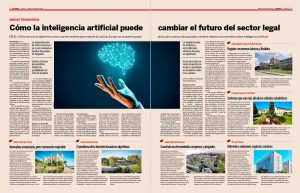A piece in the Spanish newspaper Expansión features the “Lawtomation Days” conference organized by the IE University Law School and discusses the role of algorithms as a tool to improve the legal sector (and the law itself)
The development and application of artificial intelligence (AI) grow exponentially in each of the industries of the EU market. From the administration of justice to law firms, the legal sector has not been indifferent to these changes and is more open than ever to new technologies. Applying AI in the legal sector aims to eliminate the most tedious tasks for lawyers thereby allowing them to efficiently adapt to their clients and find creative solutions that fit their needs. The new tools span a vast area of opportunities, from creating legal documents to automating basic tasks, designing algorithms in the field of predictive justice, or databases to generate statistics, among many others.
A few weeks ago, the economic and business newspaper Expansión featured a long report on the launching event of the Lawtomation Jean Monnet Centre of Excellence.

Numerous countries have committed to implementing these technologies in their legal sector. In the United States, algorithms are used – not unproblematically – to estimate the recidivism risk of certain inmates. China adopts them to predict possible crimes. Europe is not far behind. In Spain, many start-ups have been launched dedicated to the development of new technologies in the legal sector. Izempe, Firmaprofesional, Signaturit, Atalaya, Councilbox and Reclamaclick are only some of the most prominent Iberian Legal Tech startups. However, these advances are being made in a dispersed manner, without any specific regulations – a condition that could cause legal uncertainties.
In order to shed some light on this field, the Jean Monnet Centre of Excellence for Law and Automation, an EU-funded initiative of IE University Law School, addresses the opportunities and risks associated with the automation of processes that impact constitutional values, contractual relationships and workplace interactions. It does so in a cross-disciplinary and cutting-edge fashion The Centre also aims to generate knowledge and ideas that can support the formulation of public policies in these fields. According to Francisco de Elizalde, director of the Centre, «with the relentless development of AI, automation is called upon to play a more critical role». De Elizalde also highlights that the Centre will study the potential of AI when it comes to managing procedures in the context of the administration of Justice and its possible uses in conflict resolution, including alternative mechanisms.
The challenges are wide-ranging. And there is room for improvement concerning the state-of-the-art of many technologies. For AI and algorithms to be (and to be perceived as) fully reliable and trustworthy, solid rules and clear safeguards are needed. According to the experts in the fields, such as Mitisha Gaur, a researcher at the Scuola Superiore Sant’Anna in Pisa, and Karolina Olksinska-Grabowska, Ph.D. candidate at the University of Warsaw, for the time being AI systems do not appear to be able to operate in a rational, fair and impartial manner, to the extent to carry out high-risk tasks such as adjudicatory functions in courts or analytics information regarding the possible recidivism of criminals.
The mission of the Lawtomation Centre does not stop here. AI will have an impact on all economic sectors. Such a wide-ranging digital transformation is expected to come hand in hand with legal dilemmas. A clear example is how AI applications affect a person’s physical integrity and the resulting legal conundrums on how to deal with the consequences. As Sara Sánchez, professor of Law and co-director of the IE Legal Clinic at IE University Law School, points out, «should a claim for damages caused by an autonomous vehicle be filed before Spanish courts, given that Spain is part of an international convention on this matter, the courts would determine the applicable legal regime differently than, for example, German courts, as Germany is not a Contracting State to such convention and applies EU rules instead. The outcome, thus, depends on the national courts before which the claim is brought».
The promising potential of AI deserves to be unleashed in a sustainable manner. There are plenty of opportunities to be seized to bring benefits to the legal sector and society as a whole. For this to happen, there is still a lot of work to be done so that the design, deployment and deployment of digital technologies are accountable, transparent and safe.
written by Joaquín González
